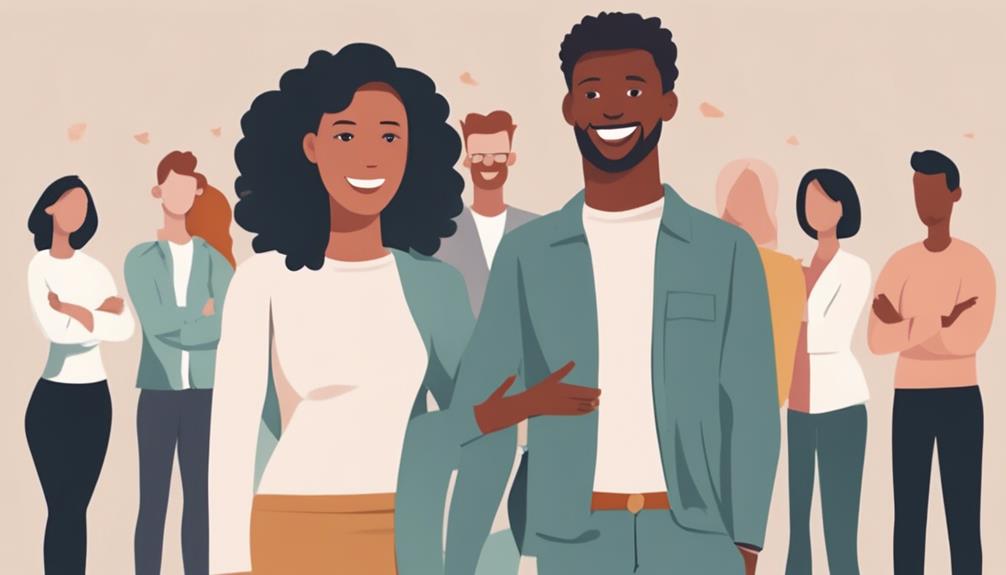10 Effective Strategies for Building Confidence in Social Situations
Imagine if every social interaction felt as effortless as a well-rehearsed dance routine, where your steps were graceful, and your confidence shone through each movement. You may have experienced those moments where you wished you could exude that same level of assurance in every encounter.
What if there were practical strategies to help you navigate social situations with ease and poise? Let’s explore how understanding social anxiety, practicing positive self-talk, mastering nonverbal communication, setting realistic goals, and stepping out of your comfort zone can all play crucial roles in building your confidence in social settings.
Understanding Social Anxiety

If you often feel nervous or self-conscious in social situations, you may be experiencing social anxiety. Identifying triggers that worsen your anxiety is crucial. These triggers could be certain social settings, specific types of interactions, or even certain people. By recognizing these triggers, you can start to manage your anxiety more effectively.
Seeking support is another essential step. Talking to friends, family, or a mental health professional can provide you with the necessary guidance and understanding. Support groups are also beneficial as they allow you to connect with others who are going through similar experiences.
Practicing Positive Self-Talk

To build confidence in social situations, start by incorporating positive self-talk into your daily routine. Using affirming mantras and confidence boosters can significantly impact how you perceive yourself and interact with others. Here are some tips to help you practice positive self-talk:
- Remind yourself of past successes and strengths.
- Challenge negative thoughts with logic and evidence.
- Repeat empowering affirmations to yourself daily.
- Visualize yourself confidently navigating social situations.
Mastering Nonverbal Communication

Mastering nonverbal communication plays a crucial role in how you convey your thoughts and emotions in social interactions. Body language and eye contact are key components of nonverbal communication that can help you appear more confident and engaging. Your body language, such as posture and gestures, can express your level of interest and openness in a conversation. Maintaining appropriate eye contact shows attentiveness and sincerity in your interactions. To improve your nonverbal communication skills, practice maintaining relaxed but upright posture, using gestures to emphasize points, and making eye contact without staring. Remember, mastering nonverbal cues can enhance your overall communication effectiveness and boost your confidence in various social situations.
| Nonverbal Communication Tips | |
|---|---|
| 1. Maintain good posture | |
| 2. Use gestures effectively | |
| 3. Make appropriate eye contact |
Setting Realistic Goals

Setting realistic goals is essential for building confidence and achieving success in social situations. When setting goals, remember to:
- Define clear boundaries: Establish limits on what you’re comfortable with and communicate them effectively.
- Break tasks into smaller steps: Make your goals manageable and less daunting to achieve.
- Track your progress: Celebrate small victories along the way to boost your confidence.
- Adjust when necessary: Be flexible and willing to modify your goals if needed to stay on the path to success.
Stepping Out of Your Comfort Zone

When expanding your horizons and challenging yourself in social settings, stepping out of your comfort zone is key to personal growth and building confidence.
Exploring new environments allows you to break free from familiarity and embrace the unknown. Trying new activities introduces you to different perspectives, fostering adaptability and resilience.
By pushing past your boundaries, you open doors to exciting opportunities and cultivate a sense of accomplishment. Embrace the discomfort that comes with stepping out of your comfort zone, as it signifies progress and self-improvement.
Each new experience is a chance to learn more about yourself and your capabilities. So, dare to take risks, embrace change, and watch your confidence soar as you navigate uncharted territories in social situations.
Conclusion
Building confidence in social situations is a process that takes time and effort, but it’s possible with practice and determination.
By understanding social anxiety, practicing positive self-talk, mastering nonverbal communication, setting realistic goals, and stepping out of your comfort zone, you can gradually overcome your fears and feel more comfortable in social settings.
Remember to be patient with yourself and celebrate small victories along the way. You have the power to build your confidence and thrive in social situations.